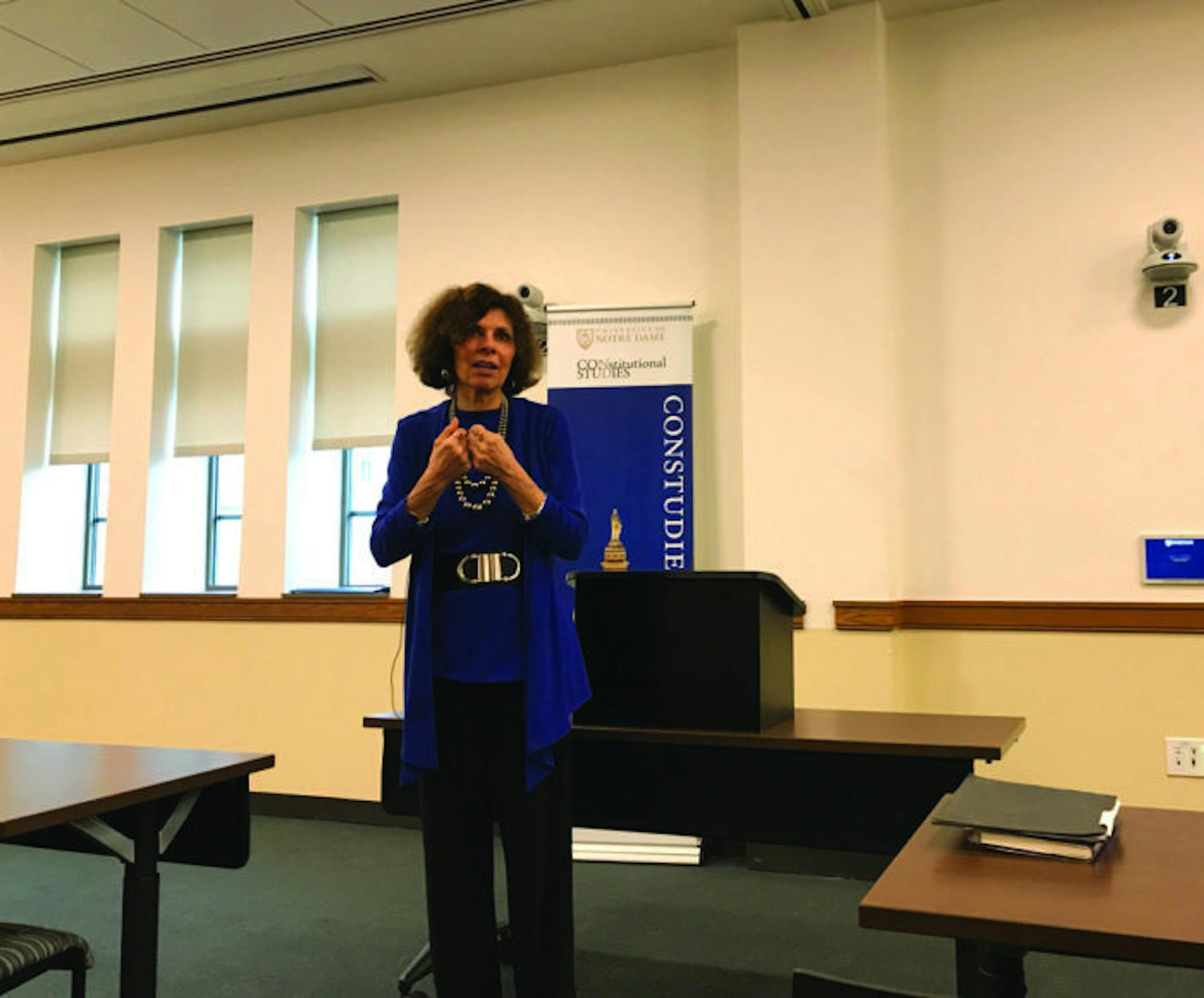Encouraging colleges and universities to defend free speech on their campuses, former national ACLU president Nadine Strossen spoke on her new book, “HATE: Why We Should Resist It with Free Speech” in a lecture Tuesday night in Jenkins-Nanovic Halls.
Strossen opened by saying she believes free speech on college campuses is under threat. Institutions are becoming hostile toward visiting speakers, with incidents like the March 2017 campus protest at Middlebury College — where students shouted down a speech by conservative author Charles Murray — becoming more and more frequent, she said.
Society has grown too ready to label the open expression of unpopular or polarizing opinions as “hate speech,” Strossen said.
“People use the ‘h’ word promiscuously to label and renounce and stigmatize any idea that they hate,” she said. “The classic way the term is used is to refer to speech that denigrates on the basis of who you are — people who are members of religious groups or racial or ethnic groups that have traditionally been marginalized and excluded. But we also are using that term more and more to completely denounce and ostracize people whose ideas we disagree with.”
This tendency has changed how society views free speech in context of civil rights issues, she said.
“The term ‘hate’ is used for policy ideas on the most important subjects — about race, about gender, about sexual orientation, immigration police — and it unfortunately has led to a great chilling of discussion, especially on campus,” she said.
This trend has created a climate in which members of college communities feel unable to freely express their opinions, Strossen said.
“There is a huge amount of self-censorship where faculty members, and students are reporting that there are entire subjects that they dare not speak about at all or dare not speak about candidly for fear of, as one of my friends put it, being called some kind of an ‘ist’ or some kind of an ‘obe,’” she said.
Strossen said she chose to write her book to provide a defense of free speech in the face of this movement.
“To the best of my examination of decades of evidence, now, of how hate speech laws have actually operated in other countries and how the absence of hate speech laws have operated in this country … I am more convinced than ever that well-intended as censorship is, it is at best, ineffective and at worst, counter-productive,” she said.
Strossen said “viewpoint neutrality,” or the idea that the government “may never hinder speech speech solely because of its viewpoint,” is one of two main precepts of First Amendment law.
“The Supreme Court has said that is the ‘bedrock principle,’” she said. “No matter how hated or hateful that viewpoint is, the way we respond to it is through our own ideas, not through suppression.”
The second principle states speech ought to be protected unless it poses an immediate safety threat, Strossen said.
“When you get beyond the content of the speech — its message, its idea, its viewpoint — and you look at the particular context … if that speech directly causes certain imminent, specific, serious harm — in other words, it causes an emergency that cannot be prevented in any other way than punishing the speech — then you can and should punish the speech,” she said.
Strossen’s research found “non-censorial counter measures” — such as counter-speech — are a powerful way to combat hate speech, she said.
“Non-censorial counter-measures … are even more effective than what I thought they would be,” she said. “My argument is based not only on free speech principles. … My argument is based on policy concerns and strategic concerns about what is actually effective not only for protecting individual liberty and democracy but also for bringing about equality and dignity.”
Strossen called on individuals from both sides of the political aisle to push back against censorship, both on college campuses and beyond.
“All of us should use every opportunity to preach not just to the choir and make common cause wherever we can, with whomever we can on issues where we agree,” she said.













